With so much of the startup news cycle focused on unprecedented funding round sizes and record amounts of time bootstrapping, we don’t often step back from the numbers to have a hard think about innovation. But today, that’s precisely what we are going to do.
The Exchange gained early access to pi Ventures’ Deep Tech Shifts 2026 report, which identifies 15 deep tech subsectors the firm believes will reach an inflection point by 2026.
The study is backed by research, but pi Ventures’ founding partner Manish Singhal says its findings are also informed by conversations with entrepreneurs.
The Exchange explores startups, markets and money.
Read it every morning on TechCrunch+ or get The Exchange newsletter every Saturday.
 Besides diving deep on the report this morning, we’ll also share what we learned from interviews with Singhal, pi’s managing director Roopan Aulakh, and principal Shubham Sandeep.
Besides diving deep on the report this morning, we’ll also share what we learned from interviews with Singhal, pi’s managing director Roopan Aulakh, and principal Shubham Sandeep.
Predicting 15 shifts
Below are 15 sectors in which pi Ventures expects “disruptive innovation that will bring about key shifts in global businesses” in the next half-decade:
- Alternative protein: superfluous to vital.
- Blockchain: promising to mainstream.
- Brain-computer interface: measurement to insight.
- Climate tech: incidental to critical.
- Data privacy: identifiable to anonymous.
- Energy storage: Li-Ion to alternative chemistries.
- Enterprise workflows: human to human + Al.
- Healthcare screening: reactive to proactive.
- MLOps: in-house to managed services.
- Nature co-design: materials to biomaterials.
- Quantum computing: supremacy to advantage.
- Robotics: automation to cognition.
- Space tech — in-space: deployment to in-space management.
- Space tech — launch: customization to democratization.
- Synthetic content creation: casual to commercial.
First off, let’s clarify that “nature co-design” refers to biomaterials, and “synthetic content creation” is about AI-generated text, images and audio, which pi expects to escalate from casual use cases to commercial.
A matter of timing
Singhal told TechCrunch that the firm recently began deploying its second fund of $100 million — a significant step up from its initial fund, which invested $30 million in 15 companies based in or with a connection to India. This time around, pi’s goal is to invest into 25 early-stage startups.
Based in Bangalore, pi’s website boasts of “pioneering deep tech investments in India.” Not all the companies in its portfolio are based there, but they all have a strong connection with the country: ML-powered consumer trend prediction platform AI Palette is based in Singapore, with an engineering hub in Bangalore, while mental health app Wysa has offices in Bangalore, Boston and London.
Singhal says pi’s goal is to back companies that are “global innovators” — aiming beyond India or any single market and leveraging deep tech. “We want to back disruptive innovation, rather than incremental innovation,” he said. On the other end of the spectrum, pi’s site notes that it doesn’t invest in “pure science or research” — it is looking for the “intersection of scalable businesses and disruptive technology.”
Timing is key to what pi is doing, a fact that underpins the 67 pages of its new report. “If you invest too early in an innovation, then you will have suboptimal returns,” Singhal said. “If you invest too late, you may also end up getting suboptimal returns, because it is no longer a cutting-edge thing. If investment and the timing of innovation getting to a resonance point come together, then good things happen.”
A framework for inflection points
This is where pi Ventures in-house framework comes in, featuring a “demand and supply resonance map” to analyze deep tech shifts. You will see it at play in the two examples we’ll explore, but the general idea is summed up in the chart below:
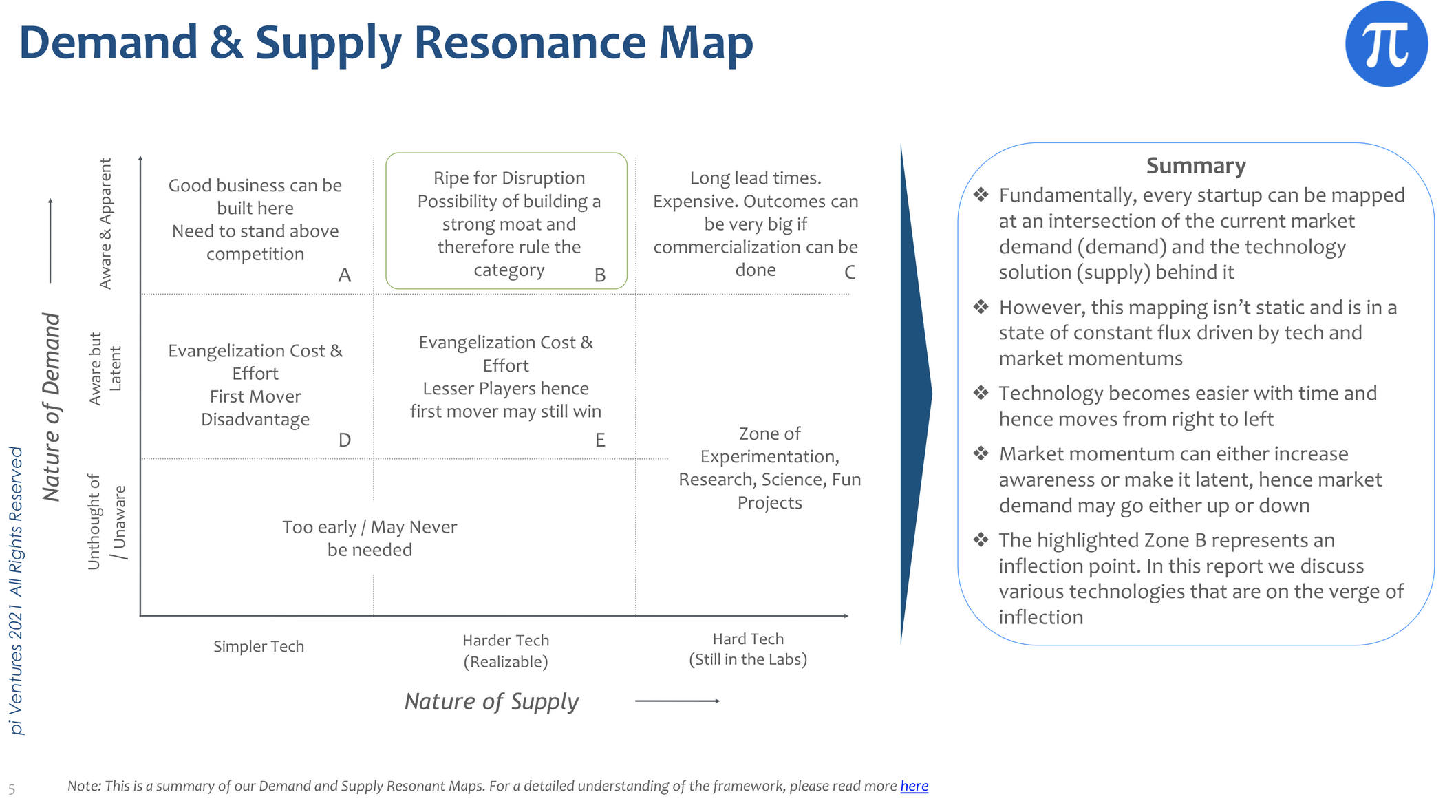
I found this to be a useful tool to analyze trends, and I think it could be of use for investors with different time horizons and theses, too.
As it previously explained in a blog post, pi Ventures’ area of interest is “the art of possible.” Dubbed as such by one of its limited partners, Raj Shah, that falls under zone B, and which “it is obvious to look at [ … ] for a good balance between market demand and state-of-the-art technology,” as well as zones C and E, “to account for momentum as well.”
“This whole framework has been a very integral part of our analysis for the last couple of years since we came up with it internally,” Singhal said. The map is also a key part of the report’s look into each trend, alongside a look at “market drivers and shifts that are currently underway,” “technology that is enabling these shifts to inflect by 2026” and “examples of emerging use cases/applications.”
Here’s what it looks like in practice:
The future of MLOps
MLOps is defined as “a set of practices that aims to deploy and maintain machine learning models in production reliably and efficiently.” Pi predicts that MLOps will go from in-house to managed services. “ML teams are moving away from performing time-consuming infra work in-house to a host of tooling that abstracts low-level infrastructure, bringing ML engineer productivity to the center stage.”
The following slide drives its point home:
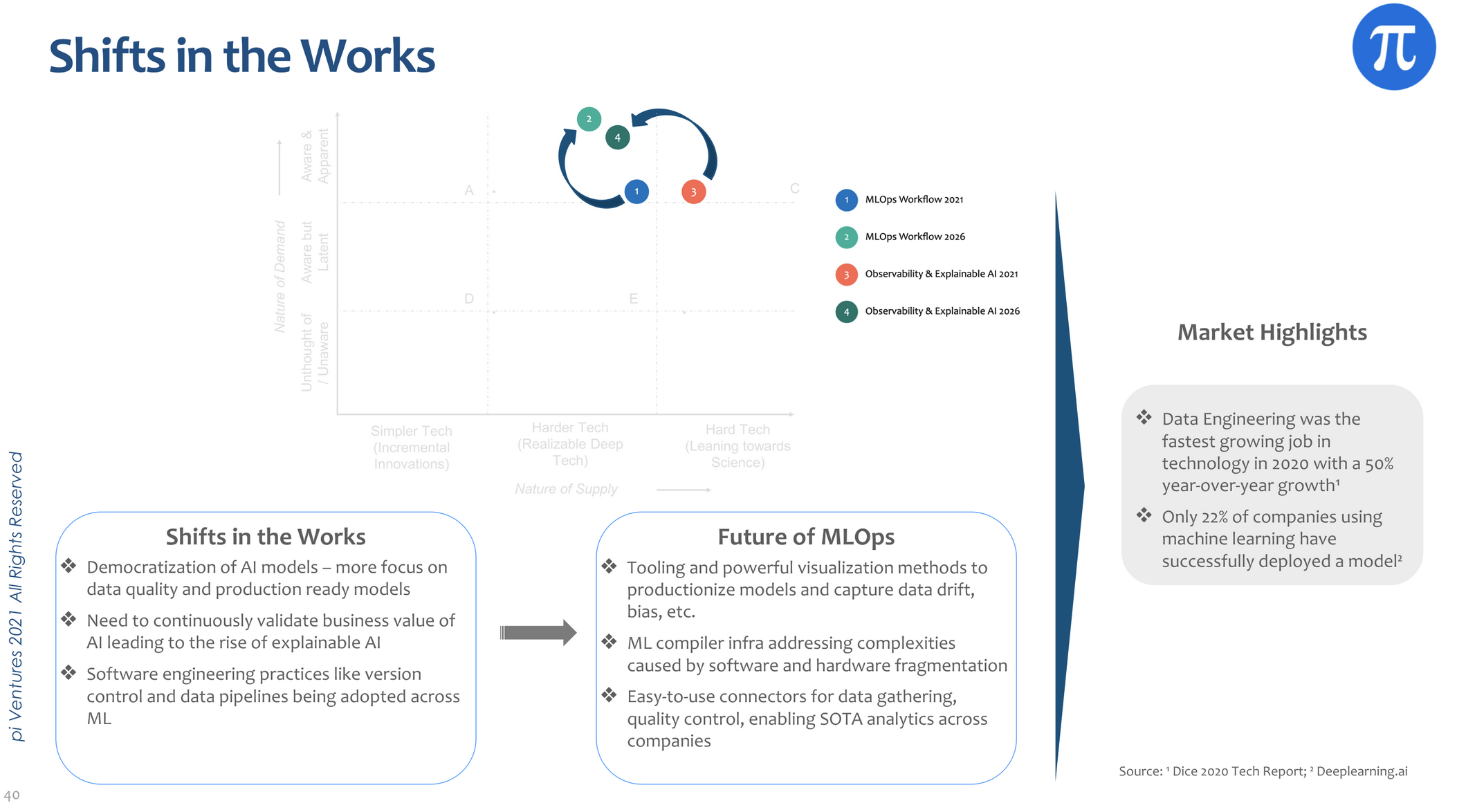
It also shows the demand and supply resonance map in action as a dynamic way to track trends. In MLOps’ case, this includes two subtrends: MLOps workflow, observability and explainable AI. According to pi’s managing director Roopan Aulakh, this was driven by a feeling that they are distinct, and that “the ways for solving these two are very different.”
Where each dot is on the map is ultimately a judgment call by pi, but a more apparent need for observability solutions that prevent data downtime does seem in line with the activity around startups in this space. The report doesn’t pinpoint specific companies, but for the sake of making this a bit less abstract, some firms that made headlines on TechCrunch over the last few months include Anomalo, Arize AI, Monte Carlo and WhyLabs.
Trends in the box on “Shifts in the works,” such as the observation “Software engineering practices like version control and data pipelines being adopted across ML,” also echo trends we’ve been seeing recently, which are all part of the broader rise of MLOps.
The report outlines four technology advancements enabling the aforementioned shifts: Explainable Al techniques that drive transparent decision-making at the business level; ML platforms that can run complex models and therefore democratize model development; automated data quality testing that helps maintain data integrity over time; and advances in querying engines that are enabling faster workloads and time iterations.
We also have examples of applications that once again are reminiscent of companies we’ve been hearing about, with the prediction that what these firms do will now be in higher demand and more realistic to achieve.
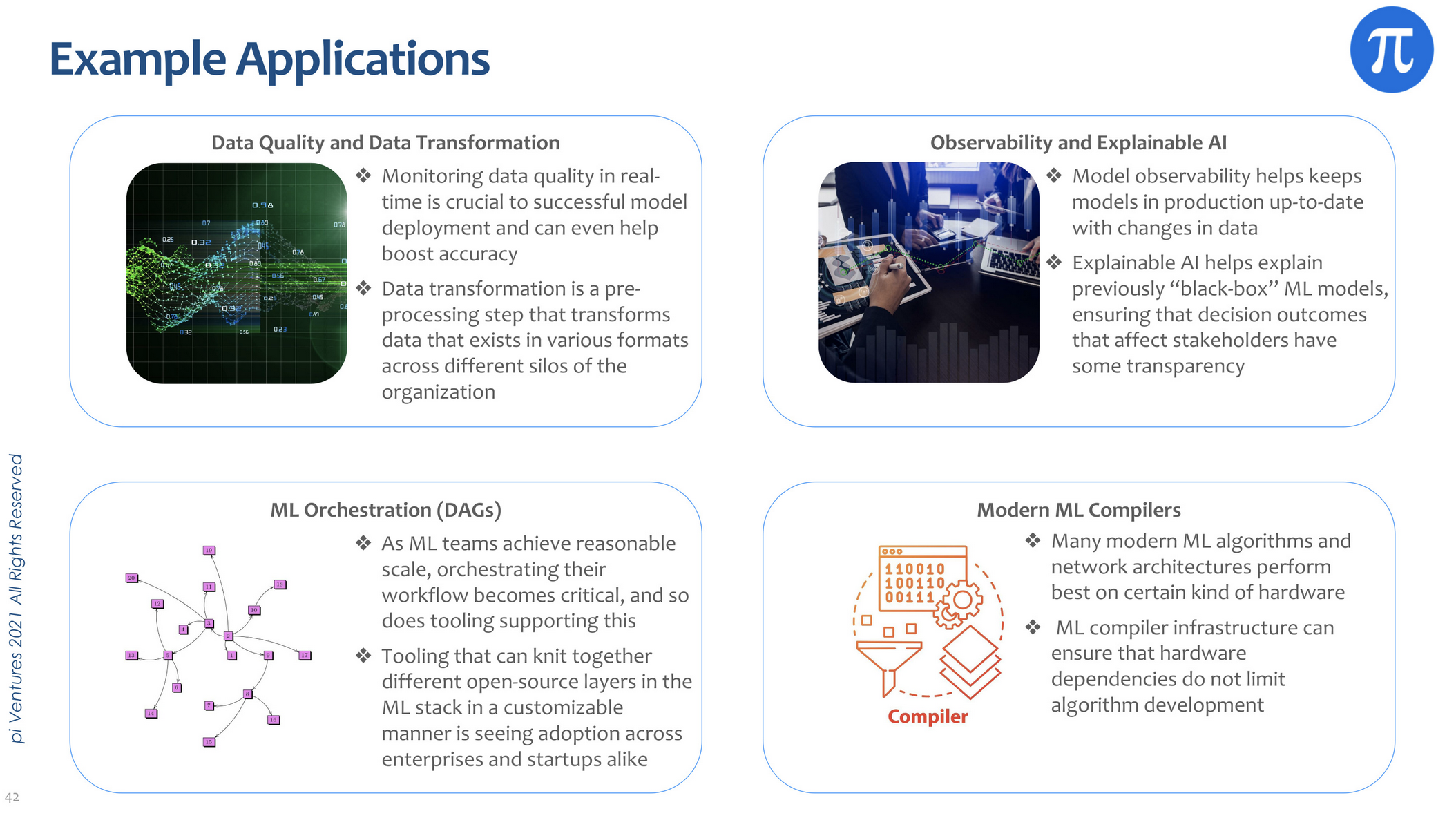
Blockchain going mainstream?
Your mileage may vary depending on which technology you are more familiar with; but for me, blockchain was a good example of what the report could teach me about a trend I have only been following casually. In a few slides, it sums up some of the shifts I have been hearing about in a way that makes me think about future use cases.
Pi’s thesis here is that blockchain has so far been synonymous with cryptocurrencies with limited real-world use cases. It predicts that scalable solutions that reduce friction in adoption will lead to more mainstream applications across consumers and enterprises.
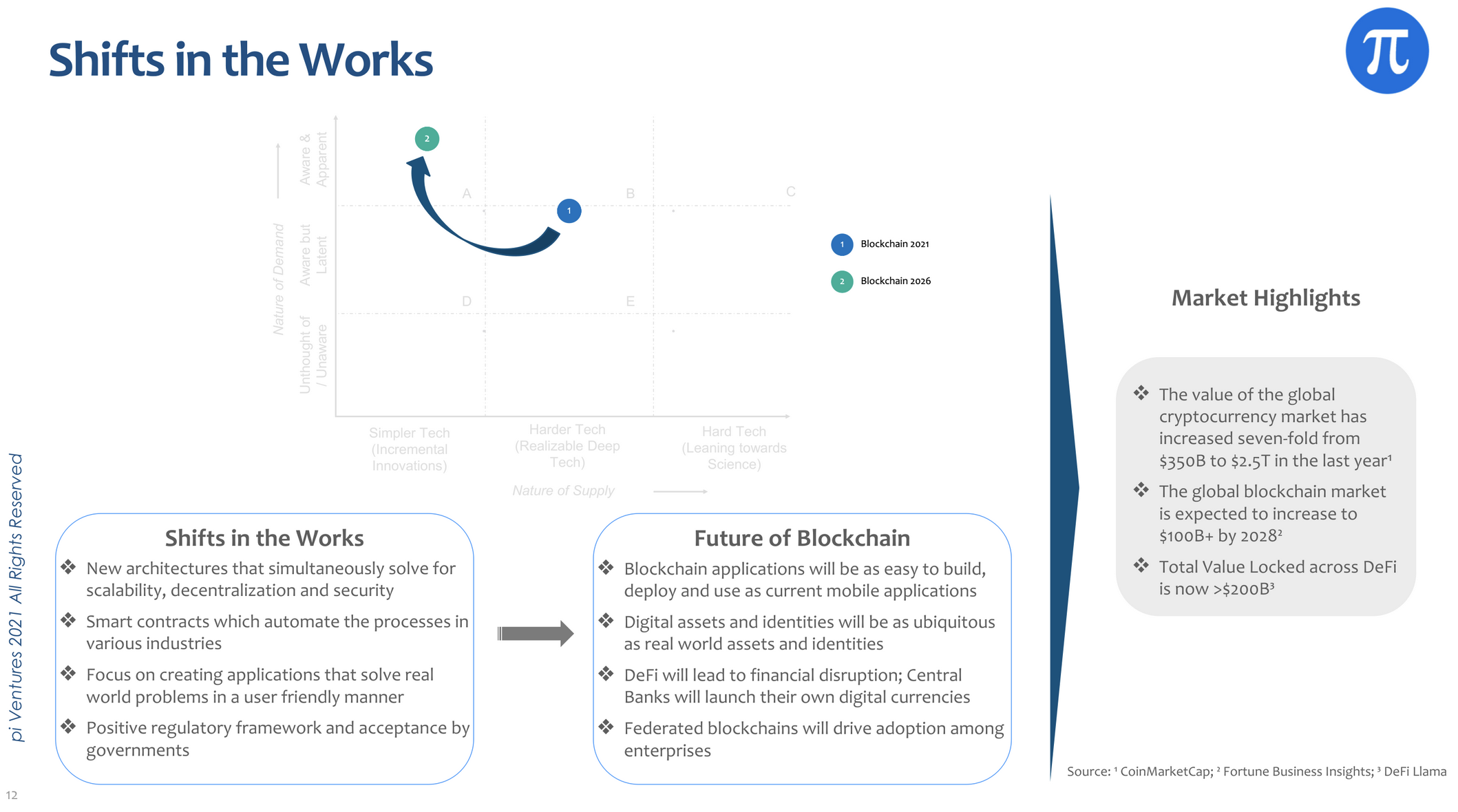
You know the drill about mapping by now, so let’s focus on market highlights instead. Pi contextualizes its predictions with data from CoinMarketCap, DefiLlama and Fortune Business Insights — the latter stating that “the global blockchain market is projected to grow from $4.68 billion in 2021 to $104.19 billion in 2028 at a CAGR of 55.8% in forecast period, 2021-2028.”
The report then goes on to give example use cases:
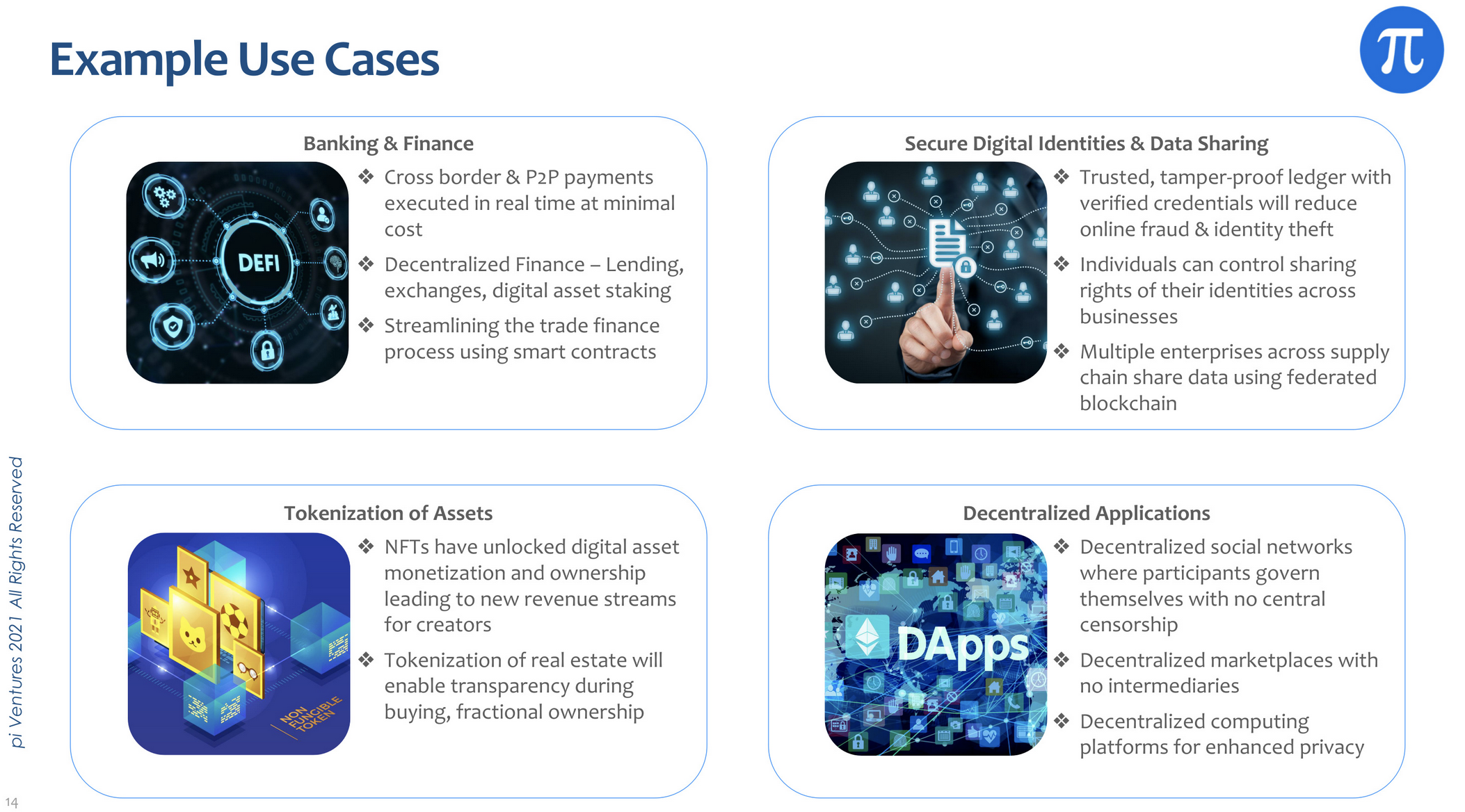
As for what’s behind this momentum, let’s just say it’s about the key challenges of blockchain now being addressed with new solutions.
For instance, the need for blockchain transaction processing to be more scalable and secure explains why a16z just invested $50 million into zkSync’s maker, Matter Labs. As TechCrunch’s own Lucas Matney noted, its zero-knowledge approach to bring roll-up scaling to Ethereum could enable “speedier and cheaper transactions without having to lose the security of the Ethereum ecosystem.” That’s something I might not have understood a few weeks ago, but I am now able to connect it to a broader trend.
Apply this to 13 other spaces and you have a useful report that’ll help you catch up on shifts that might reach their inflection point in the next few years. It also gives food for thought on what it takes to successfully invest into disruptive tech as a VC firm.
While pi Ventures has figured out what it needs — identifying shifts that will likely inflect within the next five years and deeper pockets for follow-ons — it still raises the question of whether the current framework of the VC model makes the most of it. Incidentally, that’s one of the topics we are planning to explore on The Exchange later this week. Stay tuned.































Comment